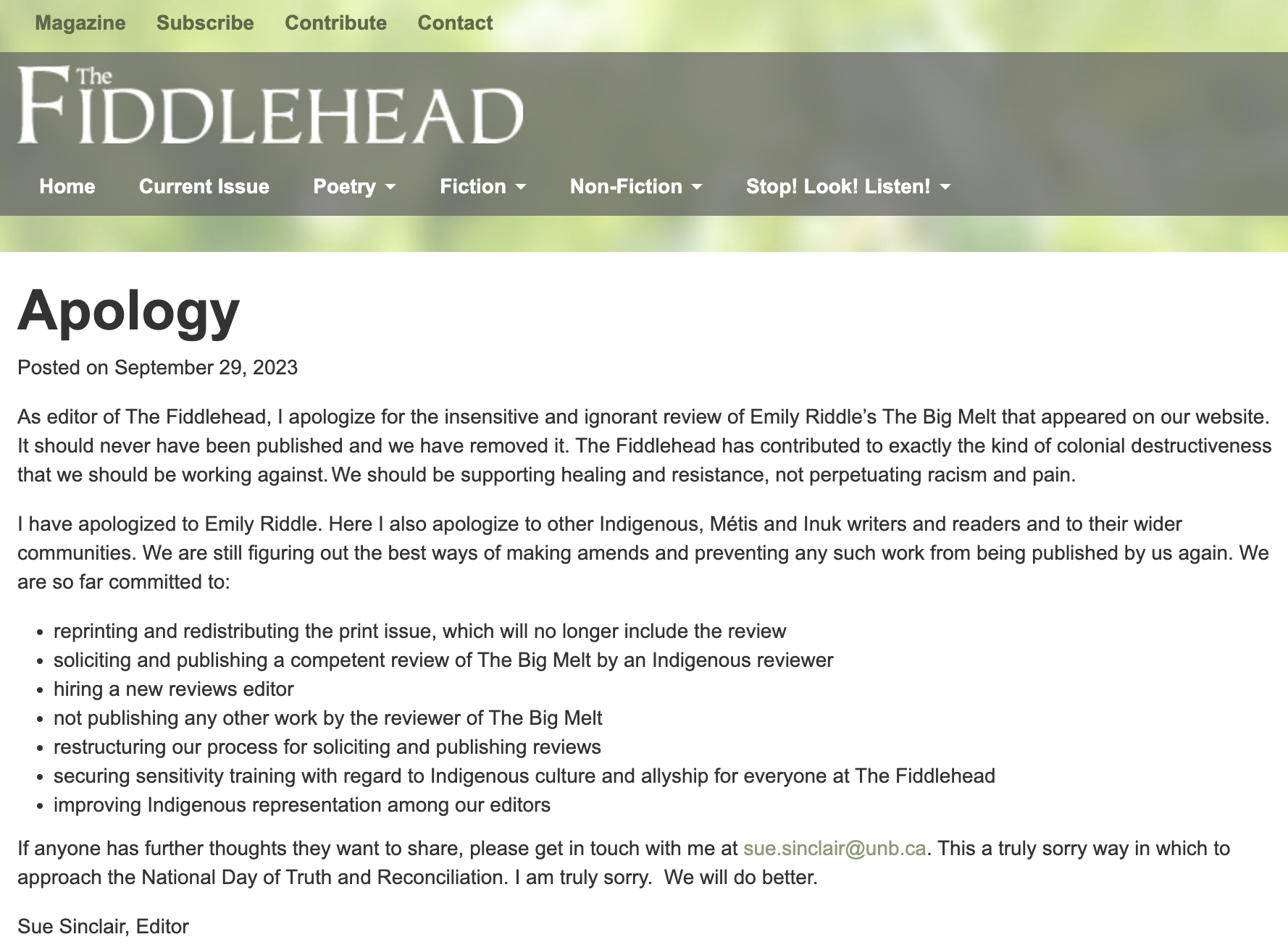Tina is a graduate of York University and has published fiction in Other Voices, The Fiddlehead and upcoming in The Impressment Gang. As a performer, she’s had the opportunity to do Shakespeare, musical theatre and TYA. She’s also been a producer and has sat on several boards and jury committees. Her plays have been produced and given development workshops at theatres including Lighthouse Festival Theatre, Solar Stage Children’s Theatre, Toronto Fringe Festival, Sears Drama Festival and Theatre BC.
“Simulation Camp”, your story in Fiddlehead 273, is some dark and twisted fun about a re-enactment of a Nazi concentration camp that turns into a disjointed mess of cross-purposes and incompetence. Your poor narrator is wedged between an anorexic intent on slow suicide and a fellow prisoner who is furious at the unauthentic level of comfort. Your bio mentions one other published story, but it looks like you’ve mostly written plays. Have you decided to branch out into fiction now? Is this part of a deliberate strategy or just a natural evolution? Have you always written stories? Would you consider other forms as well (poetry, novels, screenplays)?
Fiction is my first love. I first tried to write a book at age ten. I was very influenced by Judy Blume’s books but it wasn’t enough to read them, I wanted to write them. When I was twelve I wrote 24 chapters, some of which were only a few pages, of a manuscript called Jenny Jordan. They didn’t really fit together into a cohesive story, but in retrospect it wasn’t a bad attempt. I completed a full-length YA manuscript when I was 22. I sent queries to a few agents and one asked to see it but I lost confidence in the manuscript and never sent it.
I’ve wanted to write literary fiction for a long time. I’m not a fast writer. It sometimes takes me a year to complete a short story. “Simulation Camp” took about a year and a half, including research. The story I’m currently working on will ring in at about six months and that’s probably a record for me. Also, I’m forever tweaking. When I submit, each journal is usually getting a slightly different version.
I’m currently revising a novel that’s something of a cross between commercial fiction and absurdist humour. I’m also working on more short stories.
In my limited experience, I’ve observed that playwriting is, by necessity, a very social experience. Once the script is being workshopped or produced, you’re part of a team. Your words transformed into performance, into three-dimensional action, provide immediate feedback, while the effects of other types of writing aren’t known until much later. In fact, the writer of a story that appears in a journal might never know if it had any effect. A good story might come to life in the mind of the reader, but the writer won’t witness that. What can the first run-through on stage tell you about your script?
I agree that writing plays is a social experience. Perhaps not the initial writing but everything that comes after if you want the play produced. Hearing actors speak my words, perhaps with a totally different intent than I thought, is essential. It can also be frustrating and confusing but ultimately drama has to work when performed and not just on the page and in the mind of the playwright. I recall one first reading when the actors were totally silent once they finished. I think that was their way of saying they were underwhelmed by my first draft.
Does the playwright retain control of the script? What happens in a dispute between an artistic director and the writer? Who prevails? How often does a playwright accept changes to a script suggested by actors?
Ultimately, the play belongs to the playwright. But as mentioned, if you want that play produced you need to be willing to make changes, sometimes big ones. I want to know if something isn’t working for the director or for an actor. That doesn’t mean I take dictation, but I try to find some middle ground so long as it doesn’t change the intent of my script. (If I completely disagree with what they’re saying, I just nod my head and think “as if!”) The best actors and directors don’t say “this is wrong,” but instead ask questions.
Can good actors rescue a bad script?
My experience is that even the best actors cannot save a bad script. I’ve seen them do some good things with their own characters, but they can’t – and shouldn’t – be expected to save the entire play. Playwrights must be open to making changes or sometimes even scrapping the script completely.
I’m full of opinions on many other kinds of art and performance, but I find it very difficult to recognize bad acting. The only time I get a glimpse of what might be involved is when I’m watching a scene about acting, like Naomi Watts’ audition scene in Mulholland Drive, or Edward Norton in Birdman, or just an insanely good product such as Glengarry Glen Ross. I do my best to maintain a natural style when reading my work. What are some techniques writers can use to perfect a natural form of expression?
The best teacher of natural expression is listening, even eavesdropping, on conversations. This is one of my favorite activities while riding public transit or standing in line. People don’t censor themselves much, so this is a great learning tool and it’s free. Listen to the language but also to the spaces in between the words, those “…” you see in scripts, because that’s really important, too.
Is an acting background necessary in order to write a decent play?
I don’t know if you must have an acting background, but certainly you should have considerable familiarity with the theatre, both as a patron and as a reader.
Whenever possible, I like to read a play first and then see it performed. When I compare my pre-formed images with what I see on stage, it’s astonishing how different they sometimes are.
Does nepotism dominate the arts? I suspect this is always a danger with subjective judgment. We can probably agree on what is competent writing, but it becomes much more difficult when we try to judge great writing. It seems fairly obvious that friends do favours for friends, and it’s a natural impulse to help those you know. Is this really a problem, or is that just how the world works? Is blind judging the answer? Should there be more of an attempt to install safeguards against nepotism?
I haven’t found any evidence of nepotism with Canadian literary journals. The stories I’ve had published, or that are set to be published, were accepted by editors I did not know. Canadian literary journals are reading their slush piles because that is the only way I can explain having my own stories chosen for publication.
As for theatre, I haven’t seen nepotism as much as favoritism. I don’t think it’s rampant but it’s there. I suppose it is natural, to some degree, for theatres to want to produce certain playwrights especially if they bring in audiences or have had critical acclaim. If I have concerns that a theatre or contest is regularly playing favorites I stop submitting to them.
When your play is in production, you’re experiencing something I call bunching. Instead of one person promoting the product, you have dozens of people who can help spread the word about your play. Even if they don’t, they’re still going to invite their friends to opening night. Similarly, if you’re putting together an anthology, you have twenty times the promotion power of a single person boosting that book, as each contributor will also be an enthusiastic consumer. How does promotion work in theatre? How much are you expected to do as playwright? What has been most effective in the promotion of your work?
I’m not good at promoting my own plays. I did produce a play once and vowed never to do it again. I found it difficult to get the word out when there were so many others also vying for attention. With theatre it often comes down to the reviews and the worst is no reviews, especially in Toronto. In the case of one play, the review was good but not great and the attendance pretty much reflected that. It was part of the Fringe Festival and there were enough other plays with great reviews that there really wasn’t much more that could be done.
I much prefer having a theatre produce the work for me. I loved it when the children’s theatre producing my play created this awesome poster and brochure and I didn’t have to do a thing!





Leave A Comment